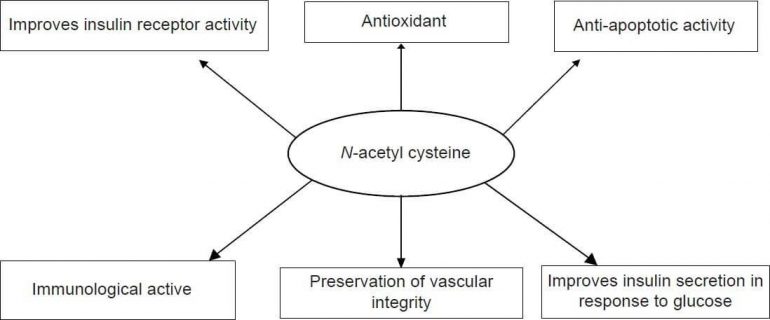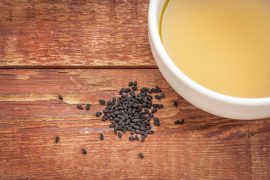NAC (N-Acetyl-Cysteine) is a form of the amino acid cysteine, an essential amino acid that the body uses to make glutathione (GSH). This supplement isn’t new, in fact it’s been around for decades and is used for a wide range of health conditions. The benefits of NAC are numerous including cardiovascular health, detoxification, immune system health and liver protection to name a few. It is also anti-inflammatory and can help to minimize or even reverse inflammatory conditions. But before we look at a few health benefits, let’s look at 3 potent actions of NAC.
- Antioxidant-This amino acid has powerful antioxidant properties. Antioxidants can help to prevent inflammation and cell damage, which makes it beneficial for a number of health conditions. NAC also increases the body’s ability to produce glutathione. Glutathione is critical for liver detoxification, brain and lung function. (1)
- Glutaminergic-NAC can help to modulate the body’s levels of glutamate. Glutamate is one of the most abundant excitatory neurotransmitters in the brain. Glutamate is involved in a wide range of behavior, learning and memory. (1)
- Dissolves mucus-NAC is particularly good at dissolving mucus in the respiratory tract and lungs. In fact studies of NAC have shown this as an effective natural remedy for respiratory and lung conditions such as bronchitis, COPD and the flu. (1,2)
14 Science Backed Benefits of NAC
The health benefits of NAC are numerous, so I will only briefly highlight a few. Numerous references are included for you, if you’d like additional information.
Detoxification-Because it contains sulfhydryl groups NAC binds to cadmium, herbicides, lead, mercury and other heavy metals, as well as environmental pollutants and microbes such as aflatoxin and E. coli.
Non- alcoholic fatty liver disease (NAFLD) – With this condition, the liver stores fat mainly due to diabetes, insulin resistance or metabolic syndrome. Studies have shown substantial improvement in liver tests with NAC supplementation.
Liver Failure– NAC is frequently given to individuals who suffer with liver failure due to acetaminophen, and been shown to greatly increase the patients chance of survival. (3, 4)
Cardiovascular System-NAC is an effective remedy to lower lipoprotein. It also helps to prevent LDL cholesterol from oxidizing and causing inflammatory damage to blood cells. In addition NAC lowers homocysteine, lower levels of homocysteine prevents plaque buildup in the arteries. (5)
Immune System Support-NAC helps to protect the body from pollutants, toxins, heavy metals and microbes. NAC is mucolytic, meaning it helps to break down and thin out mucous, this is especially helpful for individuals with asthma, bronchitis, cystic fibrosis, pneumonia and sinusitis. (6,7)
Respiratory Benefits-NAC is mucolytic, meaning it helps to break down and thin out mucous, this is especially beneficial in any health condition that involves the body’s production of excess mucous. NAC has also proven to lessen the duration and frequency of COPD (chronic obstructive pulmonary disease) attacks. (8)
Pylori –NAC inactivates H. Pylori. (9)
Kidney disease– NAC reduces inflammation in chronic kidney disease.(5)
HIV-Higher levels of NAC in the body can help to prevent one of the strains of HIV, HIV-1. (10)
Athletic performance-NAC helps to reduce muscle fatigue and enhance athletic performance.
Decrease inflammation-Reducing inflammation can help relieve many aches and pains in the body and reduce the risk of chronic inflammatory diseases. (11)
Cancer Fighter-It is also noteworthy that NAC can selectively inhibit the growth of tumor cells. It has also been noted that NAC decreases the amount of cancer signaling molecules in the body. (12,13)
Flu prevention-This double blind study of 262 adults taking 600 mg of N-A-C resulted in a significant decrease in the frequency of influenza-like episodes, severity, and length of time confined to bed. (24)
Bone regeneration-N-A-C helps with improving bone growth and regeneration. It activates osteoblastic differentiation by interacting with other bone markers such as collagen and osteopontin. In addition N-A-C hastens mineralization which increases the rate of bone growth. (15,16)

Dosages
Dosage recommendations should be discussed with your doctor and will be based on your reasons for using it. Generally speaking an optimal dose of NAC is 600 mg. two to three times a day. Ideally, take with an equivalent amount of vitamin C for maximum free radical scavenging effects.
Some people experience nausea when taking this supplement on an empty stomach. Taking this supplement with food eliminates this problem for most individuals.
Before starting NAC be sure to talk with your doctor, especially if you are on any medications. NAC may interact negatively with other prescription drugs.
References
1. Samuni, Y., Goldstein, S., Dean, O. M., & Berk, M. (2013, April 22). The chemistry and biological activities of N-acetylcysteine. Retrieved January 01, 2018, from https://www.sciencedirect.com/science/article/pii/S030441651300144X
2. Stey, C., Steurer, J., Bachmann, S., Medici, T., & Tramer, M. (2000, August 01). The effect of oral N-acetylcysteine in chronic bronchitis: a quantitative systematic review. Retrieved January 01, 2018, from http://erj.ersjournals.com/content/16/2/253.short
3. De, K. Q., Moura, F. A., Dos, J. M., De, O. R., De, J. C., & Goulart, M. O. (2015, December 18). Oxidative Stress and Inflammation in Hepatic Diseases: Therapeutic Possibilities of N-Acetylcysteine. Retrieved January 01, 2018, from https://www.ncbi.nlm.nih.gov/pubmed/26694382
4. Chun, L. J., Tong, M. J., Busuttil, R. W., & Hiatt, J. R. (2009, April). Acetaminophen hepatotoxicity and acute liver failure. Retrieved January 01, 2018, from https://www.ncbi.nlm.nih.gov/pubmed/19169150
5. The Amazing Benefits of N-A-C. (n.d.). Retrieved January 01, 2018, from http://vitalitymagazine.com/article/the-amazing-benefits-of-n-acetyl-cysteine/
6. Reichenberger, F., & Tamm, M. (2002, December). [N-acetylcystein in the therapy of chronic bronchitis]. Retrieved January 01, 2018, from https://www.ncbi.nlm.nih.gov/pubmed/12486618
7. Tirouvanziam, R., Conrad, C. K., Bottiglieri, T., Herzenberg, L. A., Moss, R. B., & Herzenberg, L. A. (2006, March 21). High-dose oral N-acetylcysteine, a glutathione prodrug, modulates inflammation in cystic fibrosis. Retrieved January 01, 2018, from https://www.ncbi.nlm.nih.gov/pmc/articles/PMC1450222/
8. Pirabbasi, E., Shahar, S., Manaf, Z. A., Rajab, N. F., & Manap, R. A. (n.d.). Efficacy of Ascorbic Acid (Vitamin C) and/N-Acetylcysteine (NAC) Supplementation on Nutritional and Antioxidant Status of Male Chronic Obstructive Pulmonary Disease (COPD) Patients. Retrieved January 01, 2018, from https://www.ncbi.nlm.nih.gov/pubmed/27117852
9. Makipour, K., & Friedenberg, F. K. (2011). The Potential Role of N-Acetylcysteine for the Treatment of Helicobacter pylori. Retrieved January 01, 2018, from https://www.ncbi.nlm.nih.gov/pmc/articles/PMC3957414/
10. Monroy, N., Herrero, L., Carrasco, L., & González, M. E. (2016, February 02). Influence of glutathione availability on cell damage induced by human immunodeficiency virus type 1 viral protein R. Retrieved January 01, 2018, from https://www.ncbi.nlm.nih.gov/pubmed/26597719
11. Origuchi, T., Migita, K., Nakashima, T., Honda, S., Yamasaki, S., Hida, A., . . . Eguchi, K. (2000, November). Regulation of cyclooxygenase-2 expression in human osteoblastic cells by N-acetylcysteine. Retrieved January 01, 2018, from https://www.ncbi.nlm.nih.gov/pubmed/?term=11079466
12. Li, J., Tu, H. J., Dai, G., Dai, Y. C., Wu, Q., Shi, Q. Z., . . . Li, Z. J. (2007, September). N-acetyl cysteine inhibits human signet ring cell gastric cancer cell line (SJ-89) cell growth by inducing apoptosis and DNA synthesis arrest. Retrieved January 01, 2018, from https://www.ncbi.nlm.nih.gov/pubmed/17700262
13. Zhang, X., Wang, Y. N., Zhu, J. J., Liu, X. X., You, H., Gong, M. Y., . . . Zhu, J. H. (2016, May 24). N-acetylcysteine negatively regulates Notch3 and its malignant signaling. Retrieved January 01, 2018, from https://www.ncbi.nlm.nih.gov/pubmed/27102435
14. Flora, S. D., Grassi, C., & Carati, L. (1997, July 01). Attenuation of influenza-like symptomatology and improvement of cell-mediated immunity with long-term N-acetylcysteine treatment. Retrieved January 01, 2018, from http://erj.ersjournals.com/content/10/7/1535.long
15. Yamada, M., Tsukimura, N., Ikeda, T., Sugita, Y., Att, W., Kojima, N., . . . Ogawa, T. (2013, August). N-acetyl cysteine as an osteogenesis-enhancing molecule for bone regeneration. Retrieved January 01, 2018, from https://www.ncbi.nlm.nih.gov/pubmed/23711675
16. Meury, T., Akhouayri, O., Jafarov, T., Mandic, V., & St-Arnaud, R. (2010, January). Nuclear alpha NAC influences bone matrix mineralization and osteoblast maturation in vivo. Retrieved January 01, 2018, from https://www.ncbi.nlm.nih.gov/pubmed/19884350








